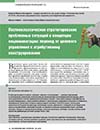Post-non-classical Strategizing of the Problem Situations in the Concept of Social Navigation: Transition from Target Management to Attributive Designing
DOI: 10.33917/es-8.166.2019.94-101
The article deals with issues related to the concept of “strategizing” — the evolution of ideas about strategizing (classical, non-classical, post-non-classical and post-classical approaches). A new understanding of the concept of problem-solving strategies is presented from the point of view of the concept of socionavigation, as a process of maneuvering using attribute design: management/regulation of intensity, direction (balance) and complexity of the discourse of a single creative field (EKP) with regard to the level of disequilibrium (K-level) system/environment, allowing to increase the efficiency of teamwork. A new construction of the notion “problem situation” is proposed as a non-zero conjunction of the actors’ ideas about the problem/ problems underlying the problem situation, their (actors) problem states and systems of key goals and values that form the problem-target area (PTA)
References:
|
1. Myasnikova T.A. Teoretiko-metodologicheskie polozheniya i metodicheskoe obespechenie strategirovaniya sotsial’no-ekonomicheskogo razvitiya munitsipal’nykh obrazovanii v regionakh Rossii [Theoretical and Methodological Provisions and Methodological Support for Strategic Planning of Municipalities’ Socio-Economic Development in the Regions of Russia]. Dis. … d-ra ekon. nauk: 08.00.05. Voronezh, 2016. 2. Zel’dner A.G. Mesto strategirovaniya v ponyatiino-kategorial’noi sisteme prognozirovaniya [Place of Strategic Planning in Conceptual-Categorical System of Forecasting]. Ekonomicheskie nauki, 2012, no 8, pp. 7–15. 3. Patrikeev N.G. Strategirovanie kak faktor effektivnogo upravleniya razvitiem territorii [Strategizing as a Factor in Effective Management of Territory Development]. Avtoref. dis. … kand. ekon. nauk: 08.00.05. Izhevsk: Permskii filial Instituta ekonomiki Ural’skogo otdeleniya Rossiiskoi akademii nauk, 2005, p. 6. 4. Knyazeva A.V. Ponyatie gorodskogo strategirovaniya [The Concept of Urban Strategic Planning and Development]. Vektor nauki TGU, 2009, no 7, p. 100. 5. Alimuradov M.K., Volosyuk L.I. Strategirovanie — novaya oblast’ professional’nykh znanii [Strategizing — a New Area of Professional Knowledge]. Upravlencheskoe konsul’tirovanie, 2017, no 11, pp. 154–159. 6. Stepin V.S. Teoreticheskoe znanie [Theoretical Knowledge]. Moscow, Progress-Traditsiya, 2003, pp. 634–635. 7. Shevyrev A.V., Mikheev V.A., Shalamova N.G., Fedotova M.A. Sistemnaya analitika v upravlenii. Vvedenie v nauchno-issledovatel’skuyu programmu [System Analytics in Management. Introduction to the Research Program]. Belgorod, LitKaraVan, 2016, p. 27. 8. Shevyrev A.V. Kreativnyi menedzhment: sinergeticheskii podkhod [Creative Management: Synergistic Approach]. Belgorod, LitKaraVan, 2007, pp. 10–18. 9. Mikheev V.A., Shevyrev A.V. Edinoe kreativnoe pole kak metauslovie komandnoi kreativnosti [Single Creative Field as a Meta-Condition of Team Creativity]. Materialy mezhdunarodnoi nauchno-prakticheskoi konferentsii “Problemy upravleniya v real’nom sektore ekonomiki: vyzovy modernizatsii” [Proceedings of the International Scientific-Practical Conference “Problems of Management in the Real Sector of Economy: Modernization Challenges”]. Vyp. 3. Moscow, GUU, 2014, pp. 191–195. 10. Taleb N. Antikhrupkost’. Kak izvlech’ vygodu iz khaosa [Anti-Fragility. How to Benefit from the Chaos]. Moscow, Azbuka-Attikus, 2014. 11. Toinbi A.Dzh. Postizhenie istorii [Comprehension of History]. Moscow, Airis-Press, 2002. 12. Budanov V.G. Upravlenie chelovekomernymi sistemami i metodologiya sinergetiki. Filosofiya upravleniya: problemy i strategii [Management of Human Measurement Systems and Synergetic Methodology. Management Philosophy: Problems and Strategies]. Moscow, IF RAN, 2010, pp. 101–103. 13. Stsenarnyi strategicheskii prognoz: Permskii krai, Rossiya i mir – 2030 [Scenario Strategic Forecast: Perm Territory, Russia and the World — 2030]. Pod obshch. red. d-ra ekon. nauk A.I. Ageeva. Moscow, INES RAN, 2016, pp. 43–50. 14. Datsyuk S.V. Obshchaya teoriya raboty s budushchim [General Theory of Operation with the Future]. Khvilya, 2016, January, 5, available at: https://hvylya.net/analytics/society/sergey-datsyuk-obshhaya-teoriya-rabotyi-s-budushhim.html. 15. Fedotova M.A. Sistemnoe upravlenie komandnoi rabotoi: evolyutsiya predstavlenii i perspektivy razvitiya [System Management of Teamwork: Evolution of Ideas and Development Prospects]. Nauchnyi rezul’tat. Sotsiologiya i upravlenie, 2018, no 4, pp. 137–150. 16. Natsional’naya psikhologicheskaya entsiklopediya, available at: https://vocabulary.ru/termin/problemnaja-situacija.html. 17. Psikhologicheskii slovar, available at: https://poisk-ru.ru/s8969t11.html. 18. Pedagogicheskii terminologicheskii slovar, available at: https://pedagogical_dictionary.academic.ru/2592/Problemnaya_situatsiya. 19. Danakin N.S., Gaivoronskaya N.I. Problemnyi analiz v sisteme sotsial’nogo upravleniya [Problem Analysis in the Social Management System]. Belgorod: IP “Ostashchenko A.A.”, 2011, pp. 46–47. 20. Lo Dzh. Posle metoda: besporyadok i sotsial’naya nauka [After the Method: Disorder and Social Science]. Moscow, Izdatel’stvo Instituta Gaidara, 2015. 21. Mikheev V.A., Fedotova M.A., Shevyrev A.V. Rabochaya komanda kak setevaya struktura, indutsiruyushchaya edinoe kreativnoe pole [Work Team as a Network Structure Inducing a Common Creative Field]. Ekonomicheskie strategii, 2013, no 5, pp. 64–67 |



